travel
Family Time
17/10/16 12:38
A little over a year ago, I wrote about how hard it is to keep up with life as well as everything we are challenged to do at work. I'm adding to this a bit today; it is hard for all of us. It is doubly hard for those of us raising kids, and I'm going to add - raising a kid with autism. For some it is hard to identify the boundaries of autism, or people have pretty severe preconceptions of what that means. A really inclusive term I've learned lately is "neurodiversity", which really helps us understand all of the interactions we end up having all day, with all sorts of people. But in particular, it reminds us that some folks are exceptionally talented in some elements of cognitive and/or social thought, and others have a mixture of differences in how they perceive sensory or other stimuli. That - to be vague, because otherwise it is personal business - is my son.
I think we take it for granted that faculty, especially junior faculty who are getting themselves known, will travel to give talks at lots of different universities, do fantastic amounts of outreach, as well as establishing top-notch research programs. But those of us considering the efforts of our junior colleagues need to be aware of the toll that going and giving talks has on family life, not to mention requests from our funding agencies to spend a week out of town to serve on funding panels! This work is necessary, and certainly service for our community of science. But, as with most invitations to give a talk at another school, I see that as an unnecessary burden to put on my family. I'm not going to shirk my support of the community, I pretty much never say no to an ad hoc proposal review, and I do plenty of manuscript editing and reviewing as well.
Travel, however, is something we should all be considering carefully in an age in which information can be shared so readily. I fully recognize that nothing yet replaces putting a bunch of colleagues in a room to discuss ongoing collaboration, to meet over shared interests, to consider the merits of a new idea or proposal. But we should find recognizable modes of service and sharing in our community that don't require so much travel, so much time away from home. There are certainly some junior faculty out there whom I've gotten to know their research because of social media; there are others who are great at other forms of sci-comm.
When you can, save the big trips for fun with your family and friends. You'll value that more some day.
I think we take it for granted that faculty, especially junior faculty who are getting themselves known, will travel to give talks at lots of different universities, do fantastic amounts of outreach, as well as establishing top-notch research programs. But those of us considering the efforts of our junior colleagues need to be aware of the toll that going and giving talks has on family life, not to mention requests from our funding agencies to spend a week out of town to serve on funding panels! This work is necessary, and certainly service for our community of science. But, as with most invitations to give a talk at another school, I see that as an unnecessary burden to put on my family. I'm not going to shirk my support of the community, I pretty much never say no to an ad hoc proposal review, and I do plenty of manuscript editing and reviewing as well.
Travel, however, is something we should all be considering carefully in an age in which information can be shared so readily. I fully recognize that nothing yet replaces putting a bunch of colleagues in a room to discuss ongoing collaboration, to meet over shared interests, to consider the merits of a new idea or proposal. But we should find recognizable modes of service and sharing in our community that don't require so much travel, so much time away from home. There are certainly some junior faculty out there whom I've gotten to know their research because of social media; there are others who are great at other forms of sci-comm.
When you can, save the big trips for fun with your family and friends. You'll value that more some day.
Friday Harbor
12/05/16 12:47
Done teaching for the spring. Whew.
For the first time, however, I'm actually teaching in the summer. I've done a Maymester course with Jim Hamrick for OTS, but generally I use the summer for research, travel, R&R, writing proposals. This year I'm delighted to be an instructor at Friday Harbor marine lab, one of the most amazing places in the world to be a biologist and interact with other amazing biologists.
One of the few downsides, however, is that to do research there - the exact projects we have proposed - means getting our act together ahead of time, knowing exactly what we need and when we need it. A lot of equipment and supplies are already at FHL, but that doesn't mean they are laying dormant waiting for us. Cooperating with the whole crew at Friday Harbor is, of course, part of the experience of getting research done close to the field (unless you are lucky enough to live there!).
So, this month is a good time for me to be in the lab. All the undergrads are gone, and as it turns out after 20 years I'm pretty good at rocking out a PCR here, a gel there, organizing equipment and supplies, and thinking of how amazing it will be when I'm there.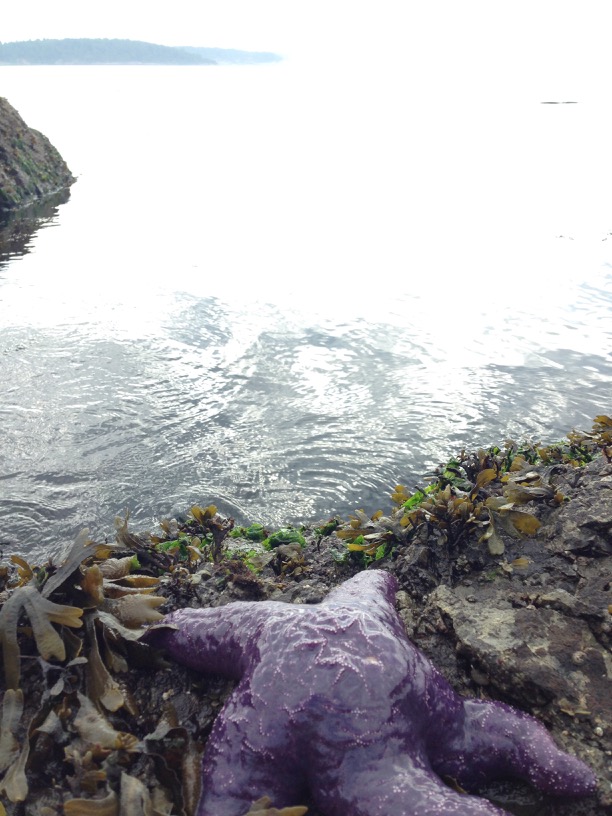
For the first time, however, I'm actually teaching in the summer. I've done a Maymester course with Jim Hamrick for OTS, but generally I use the summer for research, travel, R&R, writing proposals. This year I'm delighted to be an instructor at Friday Harbor marine lab, one of the most amazing places in the world to be a biologist and interact with other amazing biologists.
One of the few downsides, however, is that to do research there - the exact projects we have proposed - means getting our act together ahead of time, knowing exactly what we need and when we need it. A lot of equipment and supplies are already at FHL, but that doesn't mean they are laying dormant waiting for us. Cooperating with the whole crew at Friday Harbor is, of course, part of the experience of getting research done close to the field (unless you are lucky enough to live there!).
So, this month is a good time for me to be in the lab. All the undergrads are gone, and as it turns out after 20 years I'm pretty good at rocking out a PCR here, a gel there, organizing equipment and supplies, and thinking of how amazing it will be when I'm there.

Backlog Manifesto
05/07/15 13:25
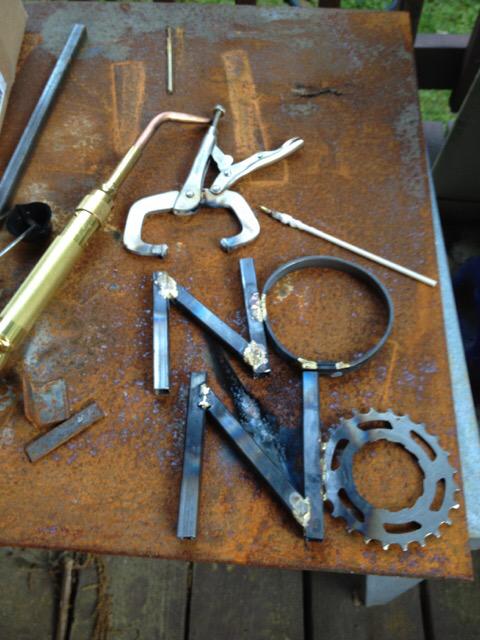
small brazing project, JPW, 2011.
Summer is a time to gain perspective, at least in the academic world where we are fortunate to have a break from teaching and committee work (or at least, less of it). For many of us, this is a time for field work and travel to conferences, a time to catch up on the writing and analysis that was put off by the pressures of teaching. It's also when we make good on a lot of promises to kids, to family, to ourselves.
I just took my first real vacation in a long time. It was unrelated to work, unrelated to research. I did as little email-checking as I needed to, though there were a few tasks to keep juggling. And it is probably really trite to come back from vacation with a clarity that "life should be more like this", but there you have it.
I have been faculty for 10 years. I've literally lost count of how many PhDs, masters, and undergrad students I have shepherded through the process of research, how many different classes I have taught, even how many of my colleagues I was on committee to hire. I'm one of the semi-old guys now. I've had plenty of funding for my research, published a lot of it. I've been graduate coordinator for 4 years, and let me tell you that is both thankless and rewarding at the same time.
What concerns me about the academic life is the pressure to keep it up, to go more and more and more. Some of this is self-inflicted, of course, but we all know the numbers games that our university administrators are running, as well. For me, this has led to a lifestyle of juggling so many different projects that I recognize fully how each is being short-changed, and the people on them as well.
When I commit to a graduate committee, or to a student being in my lab, I should be committing sufficient time to that person that they will truly gain from the interaction – not that they will have to squeeze in a few half-baked moments with me when I spend half the time recuperating my understanding of what they are doing because it has been a few weeks since we discussed it and I've had to change mental focus so many times and haven't slept well and, and, and. Period. And I worry that isn't happening.
I'm not able to read much these days; I glean. I use close to a month of work hours to being grad coordinator, probably another month to basic administration of the lab (ordering, repairing, etc.) itself, and that is not at all dismissing the work my grads put in to the same tasks. I throw myself into teaching, and have been shuffled to new teaching assignments often enough that nothing is in balance (at least it isn’t getting stale!). And most importantly, I'm having a hard time finishing what I started because I feel the pressure to start something new. This is what I'm about to tell you, needs to stop.
So, though I am on about 3 pending proposals, and associated intellectually with a couple more, I am not submitting any more this year. Or maybe next. Funding is a precious commodity for research. My effort now is not scratching my head for ideas that might be fundable, to keep the treadmill at full speed, but to focus on the ongoing work and let it identify for me what ideas need to be funded, and how. What ideas arise organically, are useful, are critical to pursue? What are the priorities? Our planet, biodiversity, public health, as well as knowledge; each of us would come up with a different list of course.
I am helping 2 students finish their PhDs, and another 6 (unless I’ve forgotten somebody, which wouldn’t be surprising) that I'm currently on their graduate committees (in the past I have been on many more at once). That feels like enough, knowing all it takes in the last push. Including those who have recently finished - a masters student, postdocs, colleagues from other labs - I have at least 20, probably many more, manuscripts that are all in various stages of being written or generated. That is enough to keep me busy for years in and of itself! I want to do this science right, to do it the best possible way, rather than frantically pushing it away to get to the next thing. The people involved deserve my attention.
Notice how committee and commitment are related...?
This also means that travel is something that I am limiting. Travel is one of the true perks of a biologist, and I have excellent and dear colleagues all over the planet at this point. I get invited for talks, I get invited for intense one-on-ones about research or collaboration, and of course there are intriguing conferences where you get the opportunity to see more of the same people but in new! exciting! places where you still drink at the bar across the street from the conference center.... and I have to say no most of the time. If I have told you “no” recently, you aren’t alone. The environmental costs of flying are high, and this is a true priority to consider. The time (and financial) costs of travel are high as well, and I have to prioritize which ones are possible in the scope of all else I do professionally and personally. I think I would be interested to see how extended teleconferencing (Google hangouts, Skype, FaceTime, etc.) could replace some of these interactions – sure, you miss the local cuisine and some beers, and some research interactions are minimized – but we shouldn't neglect this magic that has transformed our professional lives in recent years, either.
This is a long justification for why you will hear "No" from me more often than in the past. I’m not doing anything other than recognizing my career as a long-distance run rather than a sprint, I’m trying to do right by those whom I am already committed to helping, I'm trying to do justice to the science I've already committed to, and I'm trying to do what is best for my family and personal needs as well. And I promise – and some of you know I’ve been up front about this in recent requests to come give a seminar, etc. – I won’t be offended if you tell me “No” as well.
Chile and The Force
09/11/10 12:13
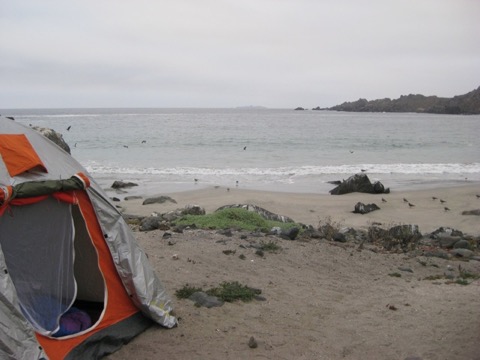
Three days in Chile, quite a weekend. I won’t say it was hectic, because I spent a lot of time waiting in airports and then a lot of time being well-cared-for by my hosts in Chile. We camped on the beach at Temblador, ate wonderful food, got to know each other well. My work in Chile dovetails very nicely with that of postdoc Jenna Shinen, who is currently based at ECIM in Las Cruces and works with Sergio Navarrete.
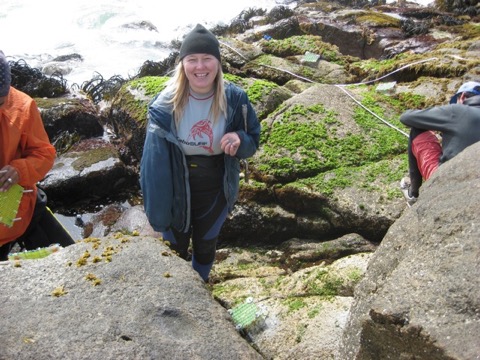
We are both studying the dynamics of the barnacles Notochthamalus and Jehlius, and this trip was an opportunity to get to know the system better (for me - Jenna knows it inside and out), meet the field technicians (Elliott and Felipe pictured below), and of course to collect some barnacles.
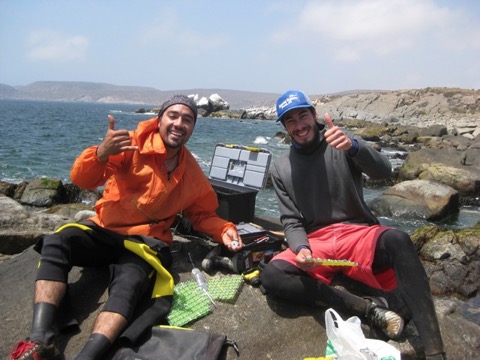
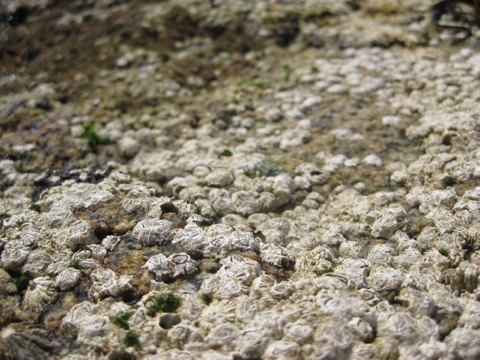
Along the way I had some fantastic seafood (mariscos), empañadas, good drinks, watched some fútbol.... and perhaps most surprisingly, got re-acquainted with Star Wars. These movies have gripped my Chilean colleagues pretty fiercely, and we spent a lot of time in the intertidal singing this:
It is amazing how easily one can fly around the world so quickly, stand in places that Darwin may have stood 150 years ago, study the same organisms....and have the most memorable component of the trip involve Darth Vader.
Portland
07/07/10 10:15
Just got back from a fantastic trip to Oregon. My lab attended the Evolution meetings in Portland, everybody gave a fantastic talk and we had really good interactions with the swarm of evolution geeks that, like good social organisms, found and followed trails to good brewpubs, restaurants, and other fun things in that beautiful city. Afterward, my family and I had a great time touring the city and heading out to the coast for a few days of R & R.
The only conundrum that remains from great meetings like this - aside from how to respond to all the great ideas that come from talking to so many talented colleagues - is the ugly environmental side of meetings. The organizers in Portland went to lengths to put us somewhere that required no driving, they encouraged bringing reusable cups, and Portland is an extremely green city. But the carbon footprint of flight cannot be ignored. There is no replacement for face-to-face interactions at these meetings; in particular, I’m thinking of some of the extraordinary grad students I talked with over the course of three days about their work and their future plans. But, we can’t ignore the impact of air travel, which sadly negates many of the things we struggle towards with our reusable cups, cycling to work, and unplugging unused appliances. The figure below was taken from a recent story in Mother Jones, and makes me queasy about the 2 flights I’ve already committed to later in 2010, and probably another 1-2 in the next year.
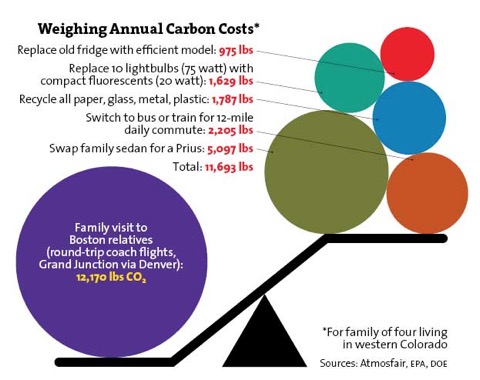
What I am going to do is something that is good for me and my family as well as for the environment. I don’t like being away too much - sometimes it is necessary, but sometimes as scientists we accept invitations to do things that mean little for our work (and more for our egos or careers). If Steve X invites me to give a talk at Fantastic University, it may be flattering and I may gain professionally, but it is not generally critical for my life or my ongoing projects. So, I’m capping myself to 4 air trips a year. That may be tough. I may have to drive to some places I ordinarily would fly to, or figure out Amtrak in the southeastern U.S. (it isn’t good, we are far behind Europe and California in this regard, look at this schedule and price for a trip to Miami!).
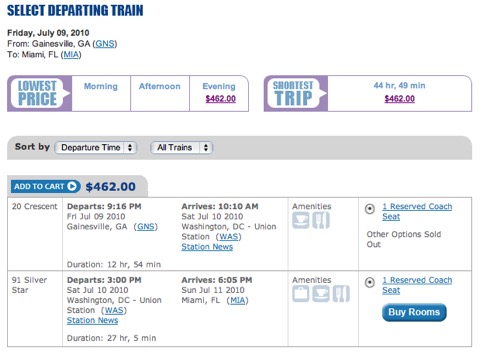
I hope my colleagues understand, but having this excuse is also good for making sure I’m home with my family just a little bit more as well.
The only conundrum that remains from great meetings like this - aside from how to respond to all the great ideas that come from talking to so many talented colleagues - is the ugly environmental side of meetings. The organizers in Portland went to lengths to put us somewhere that required no driving, they encouraged bringing reusable cups, and Portland is an extremely green city. But the carbon footprint of flight cannot be ignored. There is no replacement for face-to-face interactions at these meetings; in particular, I’m thinking of some of the extraordinary grad students I talked with over the course of three days about their work and their future plans. But, we can’t ignore the impact of air travel, which sadly negates many of the things we struggle towards with our reusable cups, cycling to work, and unplugging unused appliances. The figure below was taken from a recent story in Mother Jones, and makes me queasy about the 2 flights I’ve already committed to later in 2010, and probably another 1-2 in the next year.

What I am going to do is something that is good for me and my family as well as for the environment. I don’t like being away too much - sometimes it is necessary, but sometimes as scientists we accept invitations to do things that mean little for our work (and more for our egos or careers). If Steve X invites me to give a talk at Fantastic University, it may be flattering and I may gain professionally, but it is not generally critical for my life or my ongoing projects. So, I’m capping myself to 4 air trips a year. That may be tough. I may have to drive to some places I ordinarily would fly to, or figure out Amtrak in the southeastern U.S. (it isn’t good, we are far behind Europe and California in this regard, look at this schedule and price for a trip to Miami!).

I hope my colleagues understand, but having this excuse is also good for making sure I’m home with my family just a little bit more as well.